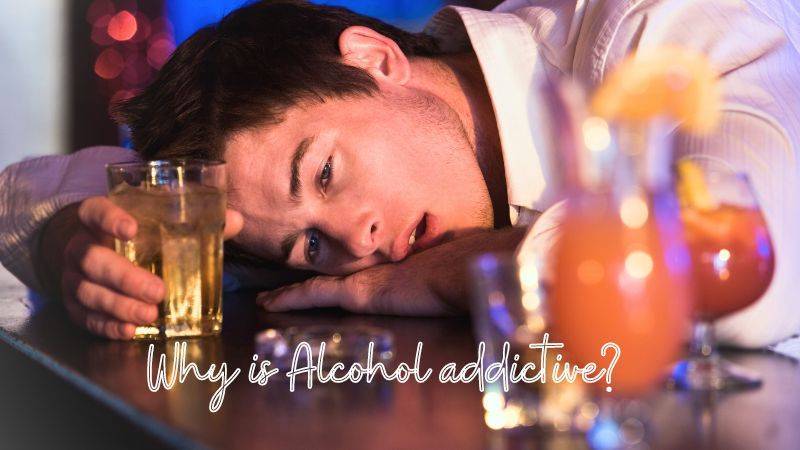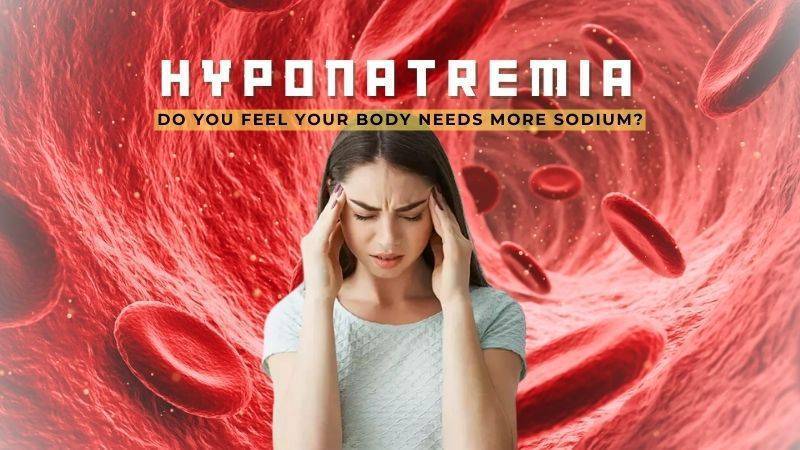Highlights
Alcohol addiction, or Alcoholism, is a chronic condition that affects millions of people worldwide. It’s a kind of disease that affects both the mind and body, making it difficult for individuals to control their consumption of alcohol.
If you have ever observed someone struggling with alcohol use disorder, you are aware that it can be difficult to find effective ways to assist them.
The reality is that people consume alcohol for various reasons, and there is no single solution that works for everyone as both physical and psychological factors contribute to addiction and must be addressed in order to successfully overcome it.
So, why is alcohol addictive? Let’s discuss:
The Brain’s Reward System

Alcohol affects the brain’s reward system by triggering the release of dopamine, a chemical that produces feelings of pleasure and euphoria.
Over time, the brain becomes accustomed to these heightened dopamine levels and begins to crave more and more alcohol to experience the same pleasurable sensations.
Research has shown that alcohol use causes dopamine levels in the brain to increase, leading to a rewarding feeling that encourages people to continue drinking.
In fact, a study found that alcohol-dependent individuals had a greater increase in dopamine release when exposed to alcohol cues than non-dependent individuals.
This suggests that the brain of an alcoholic is more sensitive to the rewarding effects of alcohol, making it more difficult to stop drinking.
As you continue to consume alcohol, your brain begins to release neurotransmitters in anticipation of drinking. Even the mere thought of alcohol or being in an environment or social setting that reminds you of alcohol can trigger feelings of pleasure.
This is a significant reason why it can be challenging to resist drinking once you have developed an addiction to alcohol.
Alcohol’s Depressant Effect
Alcohol is a depressant, which means it slows down the central nervous system. This can lead to feelings of relaxation and decreased anxiety, which can be appealing to individuals who struggle with stress and tension.

However, as the body becomes tolerant to the effects of alcohol, individuals may need to consume higher amounts to achieve the same sense of relaxation.
Research has shown that alcohol consumption can lead to a decrease in brain activity, resulting in slower reaction times, impaired decision-making skills, and reduced inhibition.
Furthermore, alcohol’s depressant effects can exacerbate the symptoms of underlying mental health conditions such as anxiety and depression, leading to a vicious cycle of alcohol dependence.
Genetics and Alcoholism
Research has identified several genes that may contribute to the development of alcoholism, including genes that affect alcohol metabolism, dopamine receptors, and the body’s stress response system.
A study of twins found that genetics account for approximately 50% of the risk of developing alcoholism, while environmental factors account for the remaining 50%.
Environmental Factors and Alcohol Addiction
Environmental factors can also play a role in alcohol addiction.
As per the research, individuals who grow up in households where alcohol use is prevalent are more likely to develop alcohol use disorders later in life.

Additionally, social norms and peer pressure can influence alcohol consumption, particularly among young adults.
A study found that college students who perceived their peers as drinking more heavily than themselves were more likely to increase their own drinking over time.
Self-Medicating with Alcohol

Individuals who turn to alcohol as a means of coping with disappointments, negative moods, emotional distress, boredom, and other difficulties are susceptible to developing alcoholism.
In fact, one study found that individuals with anxiety disorders were 2 to 3 times more likely to develop alcoholism than those without.
Alcoholics may self-medicate with alcohol for a variety of reasons, including
- Untreated emotional pain
- Symptoms of mental health disorders (such as depression, anxiety, personality disorders, and other psychiatric issues)
- Sadness and grief
- Feelings of low self-esteem
- Social anxiety
Additionally, alcohol use can worsen the symptoms of mental health conditions, leading to a vicious cycle of alcohol dependence and worsening mental health.
Withdrawal Symptoms
Individuals who are addicted to alcohol and stop drinking abruptly experience a detoxification process that may result in various physical and psychological symptoms including:
- Nausea
- Hand tremors or “the shakes”
- Depression
- Anxiety
- Insomnia
- Seizures
The process of withdrawal is extremely difficult to endure, as the brain and body yearn for the amount of alcohol they are accustomed to receiving.
Avoiding withdrawal becomes a powerful incentive for an alcoholic to persist in drinking, creating a dangerous cycle in which the individual drinks to evade the stress of withdrawal.
How Do You Treat Alcohol Addiction

The approach to treating alcohol addiction depends on several factors, including
- The duration and frequency of alcohol abuse
- Concurrent drug use
- The presence of co-occurring medical or mental health conditions
- The availability of support systems
Here are some common treatment options:
Inpatient Treatment
For some individuals, inpatient treatment may be the most effective option. This involves living at an addiction treatment center and participating in programming during the day, as well as recovery activities in the evenings.
Inpatient treatment provides round-the-clock support and distance from triggers that may lead to drinking.
Outpatient Treatment
Outpatient programming offers varying levels of treatment intensity and flexibility. These options include
- Partial hospitalization programs (PHP)
- Intensive outpatient programs (IOP)
- Regular outpatient programs
Outpatient treatment allows individuals to continue their daily routines while attending treatment sessions at designated times.
Medical Detoxification
Several medications are available to treat alcohol addiction, including
- Naltrexone
- Acamprosate
- Disulfiram
These medications work in different ways to reduce cravings, block the pleasurable effects of alcohol, and reduce withdrawal symptoms.
Behavioral Therapies
Various behavioral therapies, such as
have been shown to be effective in treating alcohol addiction. These therapies aim to help individuals identify and change negative thought patterns and behaviors associated with alcohol use and develop healthier coping strategies.
Sober Living Residences

Many people choose to live in a sober living residence while attending outpatient treatment. These residences provide a supportive and sober environment that can be more conducive to sobriety than living at home.
Overall, treatment for alcohol addiction is highly individualized, and what works for one person may not work for another.
However, by combining several of these treatment approaches, individuals with alcohol addiction can successfully overcome their addiction, maintain their sobriety, and improve their overall quality of life.
In a Nutshell
In conclusion, alcohol addiction is a complex disease that can have serious consequences on a person’s life. By addressing the underlying factors that contribute to alcohol addiction, individuals can take control of their drinking habits and improve their overall health and well-being.
Also Read






